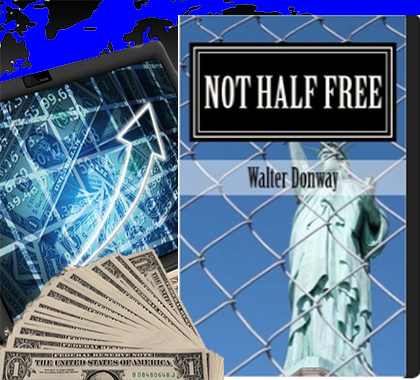In Not Half Free: The Myth That America Is Capitalist, a co-founder of a free-market think tank expertly outlines the ethical and philosophical case for making the United States a great capitalist nation once again.
The book is a delight. Walter Donway, a founding member of the Atlas Society, a free-market think tank committed to spreading the message and philosophy of Ayn Rand, makes the case for why we must fight against government control and intervention if we are all to prosper.
For decades, the United States’ standing in the world has sagged, as rights and economic freedoms have been ceded to the government. Donway’s book, a collection of 18 essays, argues although America may still be the best country in the world, it is no longer the freest. Donway says there has been a steady erosion of freedoms dating back to the 19th century.
Donway’s mission is to warn the reader of what Americans are losing, even today, and to arm them with intellectual ammunition so that they may continue the fight for liberty for generations to come.
Had 2016’s election turned out differently, the freedom-less future Donway warns the reader about would be imminent. Instead, the book provides hope for what might be—should the new president follow through on his promises.
Cronyism vs. Capitalism
The author lays the blame for creeping statism and stifled economic prosperity on crony capitalism, which he defines as “an economy in which success in business depends on a close relationship between business and government.”
Real capitalism, Donway argues, is what emerges when government consistently recognizes and protects the rights to property, free enterprise, free trade, and voluntary economic relationships.
Crony capitalism, Donway explains, favors those with political pull, motivates politicians to increase their power to deliver favors, and gives government a scapegoat to blame for the disasters of government policies and to justify further interventions and regulations, which is precisely what happened after the 2008 financial crash.
Regulatory Perversion
According to Donway, regulations are a favored tool in a crony-capitalistic scheme. They squash economic liberty and pervert otherwise honest entrepreneurs into joining the morass, by incentivizing them to resort to politics as a survival tactic.
Using the example of copper mining, the author explains how governments effectively force makers and innovators to become tools of bureaucrats.
“Consider just one example: the world today is hungry for copper to build the infrastructure of new industrial civilizations in China and India, but to open a new copper mine in the United States or Canada, say, you need permission from environmental agencies on the federal, state, and local levels,” Donway wrote. “Obtaining these permissions can require years of costly studies to satisfy hundreds of regulatory conditions. The judges are bureaucrats at all levels, usually under pressure from dozens of conflicting lobbies. Hundreds of millions of dollars ride on their decision. They may be ideologically opposed to ‘exploiting’ natural resources. To surmount their dogged opposition, you may need a politician who applauds your goal and can run interference for you. The goal is to clear the path to the production of copper—and making money.”
Arbitrary Enforcement of Laws
Donway frequently criticizes the U.S. Department of Justice in the book, saying the agency stifles any business seen as too successful with consumers.
The government has capriciously targeted popular, innovative companies such as IBM and Apple for prosecution under subjective and flexible antitrust laws, with little discernible reason other than to keep achievers afraid of the government’s “ghastly circus,” writes Donway.
“What sustains the antitrust laws decade after decade? Plainly, they are an egregious example of non-objective law,” wrote Donway. “And historically not only have they accomplished nothing, but have wasted a huge amount of taxpayer money and business resources and discouraged untold numbers of new ventures we will never know that were stillborn—by corporations afraid of stumbling into the ghastly circus called ‘antitrust.'”
Natural Resources and Advantages
Readers may find fault with Donway’s rose-colored overestimate of China’s economic power and future. China has run into increasingly serious economic troubles in recent years, and Donway seems to forget arguments he makes elsewhere in the book about the economic advantages the United States enjoys.
“In an era when economic growth is driven as never before by innovation, when knowledge and invention are the great ‘natural resource,’ the freedom to create, invest, produce, and trade no longer is merely an ‘advantage’—it is the life or death of the wealth of nations,” Donway writes, a claim readers may find contradicts his predictions of an ascendant China.
Despite that imperfection, Not Half Free: The Myth That America Is Capitalist is a highly entertaining and educational collection of essays demonstrating increased government meddling is the main cause of many of today’s problems and offering solutions based on a principled free-market philosophy.
As Donway explains, “America’s greatness is inseparable from its commitment to capitalism,” a lesson every reader should take to heart in the coming years of change and reform.




